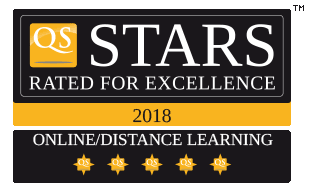Master’s Degree in Spanish as a Foreign Language: Didactics and Research Difusión
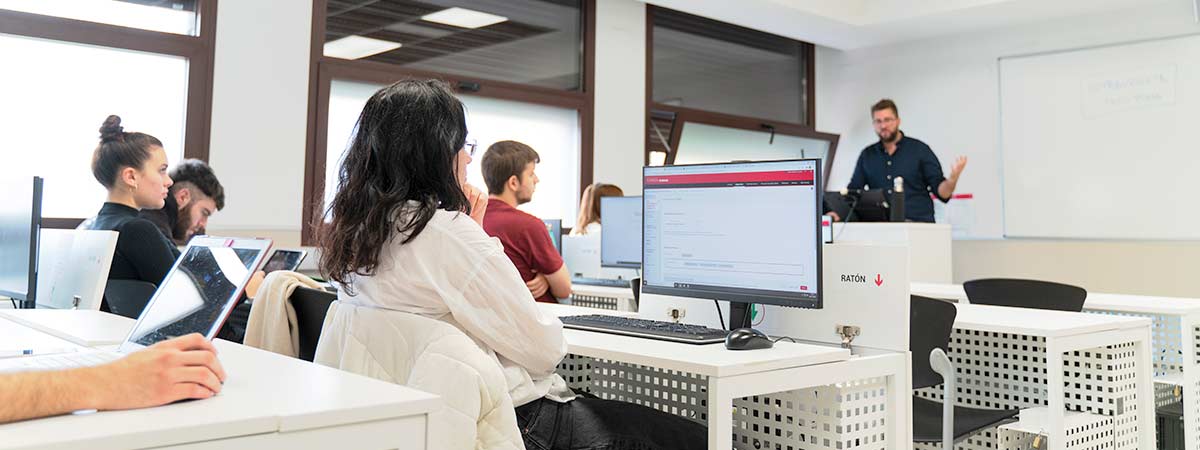
Spanish is more than just a language. It is culture, art, tradition, values and a way of thinking and feeling the world
The Master's Degree in Spanish as a Foreign Language: Didactics and Research has a double focus, professional and research, so that students decide their path based on the needs they have for their professional future.
The program responds to the growing demand for education that can be seen in native and non-native speakers who want to improve their linguistic, cultural and teaching skills, as well as in graduates of degrees from other disciplines who want to develop professionally as SFL teachers and do not have prior knowledge about the language and its didactics.
Nebrija University has Editorial Difusión as a partner of the program, which is a leader in Spain in creating educational materials and resources for teaching and learning Spanish as a foreign language (SFL).
The high percentages of employability of our graduates as SFL teachers prove the quality of the academic program, endorsed by the experience of more than 20 years of Nebrija University in training teachers and education professionals.
This official degree offers up-to-date content and a wide repertoire of subjects to design their own learning itinerary based on the students' training needs and professional interests. Contents and skills that respond to the new needs of the SFL teacher.
As the culmination of the year in which the V Centenary of the death of Antonio de Nebrija is commemorated, an exhibition was organized at the National Library of Spain that shows the intellectual profile of the first Spanish humanist, without forgetting him as a man, researcher and professor through his enormous work.
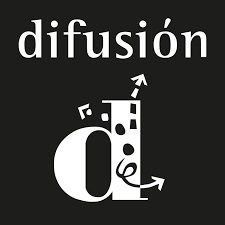
When, in 1988, the communicative method made its way into the classroom, Lourdes Miquel and Neus Sans promoted the creation of a small publishing house; its name was Difusión, and its last name, Center for Research and Publications of Spanish. A few months later, our first textbook saw the light of day: the legendary Exchange.
Its mission is to create innovative and quality educational materials and solutions for the teaching and learning of Spanish in all contexts, to support the teaching work and professional development of teachers and to be the methodological ally of the centers where Spanish is studied.
Student profile: Graduates of Bachelor's degrees or equivalent, in the areas of Philology, Linguistics, Translation, Education, Humanities and Communication Sciences.
The program may be accessed from other university degrees as long as the candidate has experience in teaching-learning other foreign languages, complementary training in foreign language teaching and the interests of a future SFL teacher.
Graduate profile:• Teachers of Spanish as a foreign language with solid knowledge of the language (C1), the culture and the didactics of Spanish as a FL.
• Professionals in the academic and scientific field of Linguistics applied to language teaching.
Official Degree:Master's Degree in Spanish as a Foreign Language: Didactics and Research
Learning Center:School of Language and Education
Branch of knowledge:Arts and Humanities
Places offered: • Face-to-face: 45
• Distance learning: 150
Total Credits 60 credits.
Minimum 12 ECTS credits and maximum 60 ECTS credits per enrollment and academic year
Part-time students:
Minimum ECTS credits: 12 • Maximum ECTS credits: 30
Academic year it was introduced: 2023/2024
Duration: 1 year.
Teaching Type: Face-to-Face – Distance learning
Academic Regulations: General student’s regulations. Credit transfer and recognition. Regulation of student participation. Common procedures for carrying out the Final Research Project
University Services: [+info]
Quality of the degree
More than 20 years of experience training Spanish teachers
Curriculum
The student must take 60 credits
First Semester 30 ECTS
From October to January, both included- 5 ECTS | Acquisition, teaching and learning of SFL
- 5 ECTS | Lecture planning and management of the SFL classroom
- 5 ECTS | Design and evaluation of activities
- 5 ECTS | Lexicon and grammar in teaching SFL
- 5 ECTS | Sociolinguistics, pragmatics and interculturality
- 5 ECTS | Virtual learning environments and digital resources
Second Semester 30 ECTS
From February to June, both included
Professional itinerary- 4 ECTS | Teaching-learning contexts of SFL I
- 4 ECTS | Teaching-learning contexts of SFL II
- 4 ECTS | Pronunciation, intonation and spelling in SFL
Research itinerary- 4 ECTS | Research methodology in Applied Linguistics
- 4 ECTS | Analysis and transfer of results in Applied Linguistics I: qualitative studies
- 4 ECTS | Analysis and transfer of results in Applied Linguistics II: quantitative studies
Internships and FRP- 6 ECTS | Internships (teachers or researchers according to itinerary)
- 12 ECTS | Final Research Project
Professors
| Doctores Doctors | Doctores acreditados Accredited doctors |
| 95,45% | 38% |
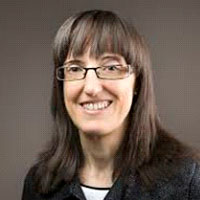 Susana Martín Leralta
Profesora
Professor
Decana de la Facultad de Lenguas y Educación de la Universidad Nebrija. Doctora por la Universidad de Bielefeld (Alemania) y Licenciada en Ciencias de la Información por la Universidad Complutense de Madrid. Su tesis doctoral obtuvo el Premio de Investigación ASELE 2008. Ha coordinado el Master en Lingüística aplicada a la enseñanza de español como lengua extranjera en la Universidad Nebrija durante siete años, es profesora de postgrado de esta Universidad y colaboradora habitual de otras instituciones. Sus líneas de investigación son la competencia estratégica, la comprensión auditiva y la evaluación. Ha publicado el libro Competencia estratégica para la comprensión auditiva en español como lengua extranjera (2009), el material didáctico Todo oídos (2011) y su Guía didáctica (2012), y diversos artículos.
Susana Martín Leralta
Profesora
Professor
Decana de la Facultad de Lenguas y Educación de la Universidad Nebrija. Doctora por la Universidad de Bielefeld (Alemania) y Licenciada en Ciencias de la Información por la Universidad Complutense de Madrid. Su tesis doctoral obtuvo el Premio de Investigación ASELE 2008. Ha coordinado el Master en Lingüística aplicada a la enseñanza de español como lengua extranjera en la Universidad Nebrija durante siete años, es profesora de postgrado de esta Universidad y colaboradora habitual de otras instituciones. Sus líneas de investigación son la competencia estratégica, la comprensión auditiva y la evaluación. Ha publicado el libro Competencia estratégica para la comprensión auditiva en español como lengua extranjera (2009), el material didáctico Todo oídos (2011) y su Guía didáctica (2012), y diversos artículos.
smartinl@nebrija.es
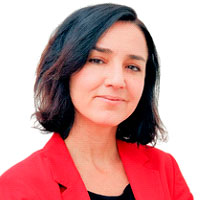 Alicia Sola Prado
Profesora
Professor
Doctora en Didáctica de la Lengua y la Literatura por la Universidad de Barcelona, con amplia experiencia docente en educación secundaria y en formación superior universitaria internacional en los ámbitos de didáctica de la lengua y la literatura, español e inglés como lengua extranjera y didáctica general e investigación educativa. Miembro desde 2011 del grupo de investigación consolidado por la AGAUR ‘GREP’ (Grup de Recerca en Entonació i Parla). Ha participado en proyectos de investigación I+D, como el de Análisis del Habla y Modelos Didácticos, ha dirigido un Proyecto de innovación sobre didáctica de la interacción oral de los idiomas nacionales y extranjeros del sistema educativo del Ecuador, coordinado la línea de investigación sobre Didáctica de la Lengua y la Literatura de la Universidad Isabel I, y dirigido un proyecto de investigación en esta misma línea. Sus aportaciones técnico científicas se insertan en las líneas de la didáctica de segundas lenguas y la fonética acústica o análisis prosódico del habla.
Alicia Sola Prado
Profesora
Professor
Doctora en Didáctica de la Lengua y la Literatura por la Universidad de Barcelona, con amplia experiencia docente en educación secundaria y en formación superior universitaria internacional en los ámbitos de didáctica de la lengua y la literatura, español e inglés como lengua extranjera y didáctica general e investigación educativa. Miembro desde 2011 del grupo de investigación consolidado por la AGAUR ‘GREP’ (Grup de Recerca en Entonació i Parla). Ha participado en proyectos de investigación I+D, como el de Análisis del Habla y Modelos Didácticos, ha dirigido un Proyecto de innovación sobre didáctica de la interacción oral de los idiomas nacionales y extranjeros del sistema educativo del Ecuador, coordinado la línea de investigación sobre Didáctica de la Lengua y la Literatura de la Universidad Isabel I, y dirigido un proyecto de investigación en esta misma línea. Sus aportaciones técnico científicas se insertan en las líneas de la didáctica de segundas lenguas y la fonética acústica o análisis prosódico del habla.
asola@nebrija.es
 Ana Aristu Ollero
Profesora
Professor
Doctora en Didáctica de la Lengua y la Literatura por la Universidad de Barcelona. Profesora de ELE en el ámbito universitario (IES Study Abroad). También es profesora en el Máster de Formación de Profesores de Español como Lengua Extranjera de UNIBA-UB y colabora en el Máster Universitario en Enseñanza del Español como Lengua Extranjera de VIU. Es tutora en la escuela de formación de profesores de idiomas Campamento Norte, donde imparte los cursos de “Análisis y diseño de materiales” y “Aprendizaje del léxico en el aula de idiomas”. Además, colabora en la editorial Difusión en el diseño y creación de materiales didácticos para diferentes colecciones: Bitácora Nueva Edición, Aula Plus, Campus Sur, Proyectos, Reporteros. Asimismo, es creadora de contenidos didácticos para la publicación Hoy en clase, del Campus Difusión. Sus áreas de especialización son el análisis y el diseño de materiales, la enseñanza a estudiantes sinohablantes y la reflexión docente.
Ana Aristu Ollero
Profesora
Professor
Doctora en Didáctica de la Lengua y la Literatura por la Universidad de Barcelona. Profesora de ELE en el ámbito universitario (IES Study Abroad). También es profesora en el Máster de Formación de Profesores de Español como Lengua Extranjera de UNIBA-UB y colabora en el Máster Universitario en Enseñanza del Español como Lengua Extranjera de VIU. Es tutora en la escuela de formación de profesores de idiomas Campamento Norte, donde imparte los cursos de “Análisis y diseño de materiales” y “Aprendizaje del léxico en el aula de idiomas”. Además, colabora en la editorial Difusión en el diseño y creación de materiales didácticos para diferentes colecciones: Bitácora Nueva Edición, Aula Plus, Campus Sur, Proyectos, Reporteros. Asimismo, es creadora de contenidos didácticos para la publicación Hoy en clase, del Campus Difusión. Sus áreas de especialización son el análisis y el diseño de materiales, la enseñanza a estudiantes sinohablantes y la reflexión docente.
aaristu@nebrija.es
 Irini Mavrou
Profesora
Professor
Doctora en Lingüística Aplicada por la Universidad Antonio de Nebrija (Premio Extraordinario de Doctorado) y Licenciada en Psicología por la Universidad Aristóteles de Tesalónica (Grecia). Profesora de postgrado de la Facultad de Lenguas y Educación y miembro del grupo de investigación LAELE. Ha participado en los proyectos de investigación Erasmus+ [2016-1-ES01-KA201-025491 (2016- 2018)], IN.MIGRA2-CM [H2015/HUM-3404] y EMILIA [FI2017- 83166-C2-2-R] y ha realizado estancias en las Universidades de Edimburgo (Erasmus+ Mobility Programme) y Birkbeck, University of London (Honorary Research Fellow; junio-septiembre 2018). Actualmente, está realizando una estancia de investigación en Institute of Education, University College London (Honorary Senior Research Associate; octubre 2019-septiembre 2020). Sus publicaciones versan sobre temas relacionados con la memoria operativa, las emociones, la expresión escrita en lengua extranjera, el análisis del discurso y el español como lengua de migración, y se pueden consultar en el siguiente enlace: https://scholar.google.co.uk/citations?user=ugHPB7AAAAAJ&hl=es
Irini Mavrou
Profesora
Professor
Doctora en Lingüística Aplicada por la Universidad Antonio de Nebrija (Premio Extraordinario de Doctorado) y Licenciada en Psicología por la Universidad Aristóteles de Tesalónica (Grecia). Profesora de postgrado de la Facultad de Lenguas y Educación y miembro del grupo de investigación LAELE. Ha participado en los proyectos de investigación Erasmus+ [2016-1-ES01-KA201-025491 (2016- 2018)], IN.MIGRA2-CM [H2015/HUM-3404] y EMILIA [FI2017- 83166-C2-2-R] y ha realizado estancias en las Universidades de Edimburgo (Erasmus+ Mobility Programme) y Birkbeck, University of London (Honorary Research Fellow; junio-septiembre 2018). Actualmente, está realizando una estancia de investigación en Institute of Education, University College London (Honorary Senior Research Associate; octubre 2019-septiembre 2020). Sus publicaciones versan sobre temas relacionados con la memoria operativa, las emociones, la expresión escrita en lengua extranjera, el análisis del discurso y el español como lengua de migración, y se pueden consultar en el siguiente enlace: https://scholar.google.co.uk/citations?user=ugHPB7AAAAAJ&hl=es
emavrou@nebrija.es
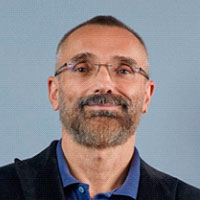 Agustín Garmendia
Profesor
Professor
Agustín Garmendia es licenciado en Biología por la U. de Barcelona. Ha ejercido como profesor de español en España y como formador de profesores. Es autor de materiales didácticos y tiene más de 25 años de experiencia en edición ELE/2. Como formador de profesores, ha impartido asignaturas de postgrado y máster en varias universidades (U. de València, MultiELE/U. de Barcelona/U. Pompeu Fabra/U. de Deusto, UNIBA) y ha realizado seminarios y talleres en universidades e institutos Cervantes de todo el mundo. Desde 1996 está vinculado a la editorial Difusión, donde ha dirigido las labores de edición de numerosos proyectos. Es también coautor de los manuales de español Aula, Bitácora y del manual de francés Version originale. Actualmente lidera el departamento de Edición Internacional de la editorial Difusión, donde dirige las colecciones de ELE/2, FLE e ILS.
Agustín Garmendia
Profesor
Professor
Agustín Garmendia es licenciado en Biología por la U. de Barcelona. Ha ejercido como profesor de español en España y como formador de profesores. Es autor de materiales didácticos y tiene más de 25 años de experiencia en edición ELE/2. Como formador de profesores, ha impartido asignaturas de postgrado y máster en varias universidades (U. de València, MultiELE/U. de Barcelona/U. Pompeu Fabra/U. de Deusto, UNIBA) y ha realizado seminarios y talleres en universidades e institutos Cervantes de todo el mundo. Desde 1996 está vinculado a la editorial Difusión, donde ha dirigido las labores de edición de numerosos proyectos. Es también coautor de los manuales de español Aula, Bitácora y del manual de francés Version originale. Actualmente lidera el departamento de Edición Internacional de la editorial Difusión, donde dirige las colecciones de ELE/2, FLE e ILS.
agarmendia@difusion.com
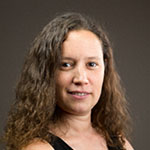 Margarita Planelles Almeida
Profesora
Professor
Doctora en Filosofía por la Universidad de Sevilla. Máster en Lingüística aplicada a la enseñanza del español como lengua extranjera por la Universidad Nebrija. Licenciada en Filosofía por la Universidad de Sevilla. Profesionalmente, ha trabajado como profesora de ELE en diferentes centros en España y en el extranjero, y como coach de español online con universidades de California (EEUU). Ha trabajado en universidades de diferentes países, investigando sobre hermenéutica, traducción y diálogo. También colabora en la elaboración de materiales didácticos en una editorial especializada en materiales de ELE. Actualmente es profesora en el Departamento de Lenguas Aplicadas y Educación de la Universidad Antonio de Nebrija. Sus líneas de investigación abarcan la psicolingüística, el análisis de errores y la adquisición y enseñanza de la competencia fonético-fonológica, así como la hermenéutica de la traducción y el diálogo.
Margarita Planelles Almeida
Profesora
Professor
Doctora en Filosofía por la Universidad de Sevilla. Máster en Lingüística aplicada a la enseñanza del español como lengua extranjera por la Universidad Nebrija. Licenciada en Filosofía por la Universidad de Sevilla. Profesionalmente, ha trabajado como profesora de ELE en diferentes centros en España y en el extranjero, y como coach de español online con universidades de California (EEUU). Ha trabajado en universidades de diferentes países, investigando sobre hermenéutica, traducción y diálogo. También colabora en la elaboración de materiales didácticos en una editorial especializada en materiales de ELE. Actualmente es profesora en el Departamento de Lenguas Aplicadas y Educación de la Universidad Antonio de Nebrija. Sus líneas de investigación abarcan la psicolingüística, el análisis de errores y la adquisición y enseñanza de la competencia fonético-fonológica, así como la hermenéutica de la traducción y el diálogo.
mplanelles@nebrija.es
 Rocío Santamaría Martínez
Profesora
Professor
Doctora en Humanidades por la Universidad Carlos III de Madrid (UC3M). Es la responsable del Centro de Escritura Nebrija y profesora de Técnicas para escribir correctamente en la misma universidad. Durante 12 años fue profesora asociada de la UC3M donde impartió las asignaturas de Técnicas de expresión oral y escrita y Lengua española. Es especialista en ELE, ha colaborado e impartido cursos de formación de profesores en el Instituto Cervantes, en la Fundación Ortega y Gasset y en diferentes universidades de España, Hungría, Portugal y Argentina. Forma parte del equipo docente del Máster de Enseñanza de Español de la Universidad Nebrija, y ha colaborado en el de la UC3M, de la UNED y de la Universidad Rey Juan Carlos. Obtuvo el premio de investigación ASELE 2009. Ha publicado artículos relacionados con la aplicación de la literatura en los cursos de ELE y la integración de actividades comunicativas de la lengua.
Rocío Santamaría Martínez
Profesora
Professor
Doctora en Humanidades por la Universidad Carlos III de Madrid (UC3M). Es la responsable del Centro de Escritura Nebrija y profesora de Técnicas para escribir correctamente en la misma universidad. Durante 12 años fue profesora asociada de la UC3M donde impartió las asignaturas de Técnicas de expresión oral y escrita y Lengua española. Es especialista en ELE, ha colaborado e impartido cursos de formación de profesores en el Instituto Cervantes, en la Fundación Ortega y Gasset y en diferentes universidades de España, Hungría, Portugal y Argentina. Forma parte del equipo docente del Máster de Enseñanza de Español de la Universidad Nebrija, y ha colaborado en el de la UC3M, de la UNED y de la Universidad Rey Juan Carlos. Obtuvo el premio de investigación ASELE 2009. Ha publicado artículos relacionados con la aplicación de la literatura en los cursos de ELE y la integración de actividades comunicativas de la lengua.
rsantamaria@nebrija.es
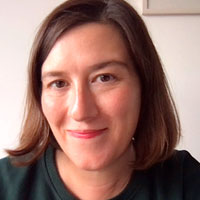 Lola Torres Ríos
Profesora
Professor
Doctora en Didáctica de la lengua y la literatura, Máster en Formación de profesores de ELE y Máster en Didáctica de la lengua (Universidad de Barcelona). Es profesora de ELE en el ámbito universitario (UAB Idiomes Barcelona, IES Abroad). Colabora como tutora en el Máster de Didáctica del Español como Lengua Extranjera de la Universidad Nebrija, en el Máster de formación de profesorado de ELE de la Universidad de Barcelona-UNIBA y en el Máster de formación y actualización de profesores de ELE de la Universitat de València. Es directora y tutora del curso Cómo innovar en la era digital del Centro de Formación del profesora del Instituto Cervantes, donde ha dirigido y tutorizado
previamente otros cursos sobre competencia digital docente. También colabora en la editorial Difusión en el diseño y creación de materiales didácticos. Actualmente dirige la escuela online de formación de profesores de idiomas Campamento Norte. En UAB Idiomes (Universitat Autònoma de Barcelona) ha formado parte del equipo directivo y tiene experiencia como coordinadora académica del área de idiomas, ha sido responsable de evaluación y de formación del profesorado. Sus áreas de especialización son las TIC, la competencia audiovisual, la reflexión docente y las estrategias de aprendizaje.
Lola Torres Ríos
Profesora
Professor
Doctora en Didáctica de la lengua y la literatura, Máster en Formación de profesores de ELE y Máster en Didáctica de la lengua (Universidad de Barcelona). Es profesora de ELE en el ámbito universitario (UAB Idiomes Barcelona, IES Abroad). Colabora como tutora en el Máster de Didáctica del Español como Lengua Extranjera de la Universidad Nebrija, en el Máster de formación de profesorado de ELE de la Universidad de Barcelona-UNIBA y en el Máster de formación y actualización de profesores de ELE de la Universitat de València. Es directora y tutora del curso Cómo innovar en la era digital del Centro de Formación del profesora del Instituto Cervantes, donde ha dirigido y tutorizado
previamente otros cursos sobre competencia digital docente. También colabora en la editorial Difusión en el diseño y creación de materiales didácticos. Actualmente dirige la escuela online de formación de profesores de idiomas Campamento Norte. En UAB Idiomes (Universitat Autònoma de Barcelona) ha formado parte del equipo directivo y tiene experiencia como coordinadora académica del área de idiomas, ha sido responsable de evaluación y de formación del profesorado. Sus áreas de especialización son las TIC, la competencia audiovisual, la reflexión docente y las estrategias de aprendizaje.
ltorresr@nebrija.es
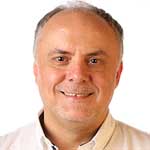 Carlos de Pablos Ortega
Profesor
Professor
Doctor Europeus y Máster en Lingüística Aplicada por la Universidad Nebrija. Licenciado en Filología inglesa por la Universidad Complutense de Madrid. Ha ejercido su labor docente e investigadora en el Centro de Estudios Hispánicos de la Universidad Nebrija en Madrid, en la Universidad de Bangor (País de Gales, Reino Unido), en la Universidad de Sídney (Australia) y en Woodside High School (Virginia - E.E.U.U). Desde 2007 es profesor titular (Assistant Professor) en la Universidad de East Anglia (Reino Unido) en donde imparte las asignaturas: herramientas para la traducción audiovisual y la accesibilidad, lingüística aplicada y español como lengua extranjera. Su investigación se enmarca el ámbito de la pragmática contrastiva, la didáctica del español como lengua extranjera, la traducción audiovisual y la accesibilidad. Es coautor del libro Seamos Pragmáticos: Introducción a la pragmática Española publicado por Yale University Press (2014) y ha publicado artículos de investigación en las revistas internacionales Journal of Pragmatics, Sociocultural Pragmatics y Pragmatics. Su labor docente ha sido reconocida con los premios a la excelencia en la enseñanza en la Universidad de East Anglia (Reino Unido) en 2011 y en la Universidad de Sídney (Australia) en 2015 y 2016 . En la actualidad dirige el proyecto de traducción audiovisual y accesibilidad Support for Access to Audiovisual Media (SAAM - https://saamproject.org/) con alumnos voluntarios de la Universidad de East Anglia (Reino Unido).
Carlos de Pablos Ortega
Profesor
Professor
Doctor Europeus y Máster en Lingüística Aplicada por la Universidad Nebrija. Licenciado en Filología inglesa por la Universidad Complutense de Madrid. Ha ejercido su labor docente e investigadora en el Centro de Estudios Hispánicos de la Universidad Nebrija en Madrid, en la Universidad de Bangor (País de Gales, Reino Unido), en la Universidad de Sídney (Australia) y en Woodside High School (Virginia - E.E.U.U). Desde 2007 es profesor titular (Assistant Professor) en la Universidad de East Anglia (Reino Unido) en donde imparte las asignaturas: herramientas para la traducción audiovisual y la accesibilidad, lingüística aplicada y español como lengua extranjera. Su investigación se enmarca el ámbito de la pragmática contrastiva, la didáctica del español como lengua extranjera, la traducción audiovisual y la accesibilidad. Es coautor del libro Seamos Pragmáticos: Introducción a la pragmática Española publicado por Yale University Press (2014) y ha publicado artículos de investigación en las revistas internacionales Journal of Pragmatics, Sociocultural Pragmatics y Pragmatics. Su labor docente ha sido reconocida con los premios a la excelencia en la enseñanza en la Universidad de East Anglia (Reino Unido) en 2011 y en la Universidad de Sídney (Australia) en 2015 y 2016 . En la actualidad dirige el proyecto de traducción audiovisual y accesibilidad Support for Access to Audiovisual Media (SAAM - https://saamproject.org/) con alumnos voluntarios de la Universidad de East Anglia (Reino Unido).
cpablos@nebrija.es
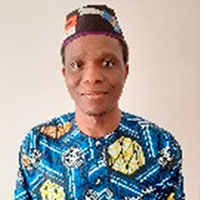 Roméo Gbaguidi
Profesor
Professor
Doctor en Humanidades por la Universidad Calos III de Madrid. Profesor asociado de la Universidad Antonio de Nebrija y profesor-investigador invitado en universidades de varios países, coordina también algunas iniciativas de empoderamiento y sensibilización de personas migrantes en diferentes contextos. Desde 2009, preside la asociación DESTINO BENIN (ONGD). Entre 2006 y 2010 ha sido mediador intercultural y director del Centro de Participación e Integración de Inmigrantes (CEPI) Hispano-Africano de la Comunidad de Madrid (España). En 2012, fue galardonado con el premio “Africano de Excelencia” por su trabajo y compromiso por la integración de los inmigrantes en España y, en 2018, fue homenajeado en Tiznit, Marruecos por el Observatorio Regional de Migraciones, Espacios y Sociedades (ORMES) y la Asociación de Investigadores en Migración y Desarrollo (ACMD) de la Universidad Ibn Zohr de Agadir. Sus líneas de investigación son la interculturalidad, los procesos migratorios internacionales y la pragmática lingüístico-cultural.
Roméo Gbaguidi
Profesor
Professor
Doctor en Humanidades por la Universidad Calos III de Madrid. Profesor asociado de la Universidad Antonio de Nebrija y profesor-investigador invitado en universidades de varios países, coordina también algunas iniciativas de empoderamiento y sensibilización de personas migrantes en diferentes contextos. Desde 2009, preside la asociación DESTINO BENIN (ONGD). Entre 2006 y 2010 ha sido mediador intercultural y director del Centro de Participación e Integración de Inmigrantes (CEPI) Hispano-Africano de la Comunidad de Madrid (España). En 2012, fue galardonado con el premio “Africano de Excelencia” por su trabajo y compromiso por la integración de los inmigrantes en España y, en 2018, fue homenajeado en Tiznit, Marruecos por el Observatorio Regional de Migraciones, Espacios y Sociedades (ORMES) y la Asociación de Investigadores en Migración y Desarrollo (ACMD) de la Universidad Ibn Zohr de Agadir. Sus líneas de investigación son la interculturalidad, los procesos migratorios internacionales y la pragmática lingüístico-cultural.
aromeo@nebrija.es
 Hugo Lázaro Ruiz
Profesor
Professor
Doctor y Máster en Lingüística Aplicada a la Enseñanza del Español como Lengua Extranjera por la Universidad Nebrija. Licenciado en Ciencias de la Información por la Universidad Complutense de Madrid. Profesionalmente, ha ejercido la docencia en la Fundación IES Abroad, el Centro de Estudios Hispánicos, así como en diversas academias de idiomas en Madrid. Sus líneas de investigación se centran en el ámbito de la pragmática, la sociolingüística y el análisis de materiales didácticos.
Hugo Lázaro Ruiz
Profesor
Professor
Doctor y Máster en Lingüística Aplicada a la Enseñanza del Español como Lengua Extranjera por la Universidad Nebrija. Licenciado en Ciencias de la Información por la Universidad Complutense de Madrid. Profesionalmente, ha ejercido la docencia en la Fundación IES Abroad, el Centro de Estudios Hispánicos, así como en diversas academias de idiomas en Madrid. Sus líneas de investigación se centran en el ámbito de la pragmática, la sociolingüística y el análisis de materiales didácticos.
hlazaro@nebrija.es
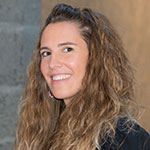 Sara González Berrio
Profesora
Professor
Doctora en Lingüística Aplicada a la Enseñanza de Lenguas por la Universidad Nebrija y en Lingüística y Lengua Portuguesa por la Universidade Estadual Paulista (FCLAr/UNESP). Su tesis doctoral ha recibido el Premio Extraordinario de Doctorado. Licenciada en Traducción e Interpretación por la Universidad de Salamanca, cursó el Máster Universitario en Lingüística Aplicada a la Enseñanza de ELE en la Universidad Nebrija. Participó en el programa de Lectorados MAEC-AECID de 2013 a 2018 impartiendo clases de español en dos universidades brasileñas y actúa como examinadora de los exámenes DELE desde 2016. Forma parte del grupo de investigación en Pragmática (inter)linguística, cross-cultural e intercultural de la Universidad de São Paulo. Sus líneas de investigación se centran en el ámbito de la pragmática, la interculturalidad, los géneros discursivos y la expresión escrita.
Sara González Berrio
Profesora
Professor
Doctora en Lingüística Aplicada a la Enseñanza de Lenguas por la Universidad Nebrija y en Lingüística y Lengua Portuguesa por la Universidade Estadual Paulista (FCLAr/UNESP). Su tesis doctoral ha recibido el Premio Extraordinario de Doctorado. Licenciada en Traducción e Interpretación por la Universidad de Salamanca, cursó el Máster Universitario en Lingüística Aplicada a la Enseñanza de ELE en la Universidad Nebrija. Participó en el programa de Lectorados MAEC-AECID de 2013 a 2018 impartiendo clases de español en dos universidades brasileñas y actúa como examinadora de los exámenes DELE desde 2016. Forma parte del grupo de investigación en Pragmática (inter)linguística, cross-cultural e intercultural de la Universidad de São Paulo. Sus líneas de investigación se centran en el ámbito de la pragmática, la interculturalidad, los géneros discursivos y la expresión escrita.
sgonzalezbe@nebrija.es
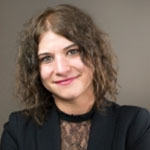 Ocarina Masid Blanco
Profesora
Professor
Doctora en Lengua española y Máster Universitario en Español como segunda lengua por la Universidad Complutense de Madrid y Licenciada en Filología Hispánica por la Universidad de Santiago de Compostela. Coordinadora académica del Doctorado en Lingüística aplicada a la enseñanza de lenguas de la Universidad Nebrija donde es profesora del Departamento de Lenguas aplicadas. Ha dirigido el Máster Universitario en Didáctica de ELE de esta misma universidad durante 6 años. Como miembro del grupo de investigación LAELE, sus líneas de investigación, en el marco de Lingüística cognitiva, se dirigen al impacto emocional de la metáfora y el lenguaje figurado en L1 y LE, su relación con otros procesos cognitivos, las aplicaciones didácticas de la teoría cognitiva de la metáfora y otros enfoques para la enseñanza-aprendizaje del léxico en ELE. Además, está interesada en metodologías activas (aprendizaje cooperativo, gamificación, clase invertida,) y TIC para la enseñanza del español y su impacto emocional en el aprendizaje. Ha participado en proyectos de investigación y de innovación docente sobre estas temáticas y cuenta con publicaciones científicas en revistas de impacto, capítulos de libro y una monografía en la editorial Arco/Libros.
Ocarina Masid Blanco
Profesora
Professor
Doctora en Lengua española y Máster Universitario en Español como segunda lengua por la Universidad Complutense de Madrid y Licenciada en Filología Hispánica por la Universidad de Santiago de Compostela. Coordinadora académica del Doctorado en Lingüística aplicada a la enseñanza de lenguas de la Universidad Nebrija donde es profesora del Departamento de Lenguas aplicadas. Ha dirigido el Máster Universitario en Didáctica de ELE de esta misma universidad durante 6 años. Como miembro del grupo de investigación LAELE, sus líneas de investigación, en el marco de Lingüística cognitiva, se dirigen al impacto emocional de la metáfora y el lenguaje figurado en L1 y LE, su relación con otros procesos cognitivos, las aplicaciones didácticas de la teoría cognitiva de la metáfora y otros enfoques para la enseñanza-aprendizaje del léxico en ELE. Además, está interesada en metodologías activas (aprendizaje cooperativo, gamificación, clase invertida,) y TIC para la enseñanza del español y su impacto emocional en el aprendizaje. Ha participado en proyectos de investigación y de innovación docente sobre estas temáticas y cuenta con publicaciones científicas en revistas de impacto, capítulos de libro y una monografía en la editorial Arco/Libros.
omasid@nebrija.es
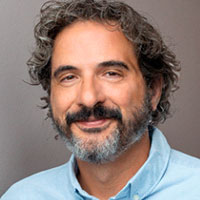 Sergio Troitiño Chinarro
Profesor
Professor
Licenciado en Filología Hispánica y máster en Formación de Profesores de ELE (Universidad de Barcelona). Ha sido profesor de ELE en Barcelona y en Chicago. Ha impartido cursos de formación en instituciones y centros de enseñanza de ELE de todo el mundo. Colabora como docente en el Máster de Experto en ELE en ámbitos profesionales y en el Máster en Formación de Profesores de ELE, ambos de la UB y en el Máster de ELE de Nebrija. Trabaja en la editorial Difusión como formador y editor digital. Ha sido editor del manual Gente hoy.
Está vinculado a proyectos formativos para Campus Difusión y dirige los Webinars ELE. Es coautor de Cuadernos de gramática española y Complementos de gramática y vocabulario del curso Aula. Ha publicado varios artículos de didáctica.
Sergio Troitiño Chinarro
Profesor
Professor
Licenciado en Filología Hispánica y máster en Formación de Profesores de ELE (Universidad de Barcelona). Ha sido profesor de ELE en Barcelona y en Chicago. Ha impartido cursos de formación en instituciones y centros de enseñanza de ELE de todo el mundo. Colabora como docente en el Máster de Experto en ELE en ámbitos profesionales y en el Máster en Formación de Profesores de ELE, ambos de la UB y en el Máster de ELE de Nebrija. Trabaja en la editorial Difusión como formador y editor digital. Ha sido editor del manual Gente hoy.
Está vinculado a proyectos formativos para Campus Difusión y dirige los Webinars ELE. Es coautor de Cuadernos de gramática española y Complementos de gramática y vocabulario del curso Aula. Ha publicado varios artículos de didáctica.
stroitino@nebrija.es
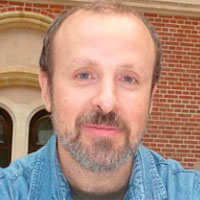 José Amenós Pons
Profesor
Professor
Licenciado en Filología Hispánica (Universidad de Barcelona), máster ELE (Universidad de Barcelona) y Doctor en Filología Hispánica (UNED). Ha enseñado español durante más de 25 años en distintos países e instituciones. Profesor titular del Instituto Cervantes y de las Escuelas Oficiales de Idiomas de Madrid, en situación de excedencia. Actualmente es profesor de lengua española en la Facultad de Filología de la Universidad Complutense de Madrid. Coautor de materiales didácticos para ELE en distintas editoriales. Investigador en las relaciones entre gramática y pragmática y en procesos de adquisición/aprendizaje de L2, ha participado en varios proyectos de investigación I+D relacionados con estos temas.
José Amenós Pons
Profesor
Professor
Licenciado en Filología Hispánica (Universidad de Barcelona), máster ELE (Universidad de Barcelona) y Doctor en Filología Hispánica (UNED). Ha enseñado español durante más de 25 años en distintos países e instituciones. Profesor titular del Instituto Cervantes y de las Escuelas Oficiales de Idiomas de Madrid, en situación de excedencia. Actualmente es profesor de lengua española en la Facultad de Filología de la Universidad Complutense de Madrid. Coautor de materiales didácticos para ELE en distintas editoriales. Investigador en las relaciones entre gramática y pragmática y en procesos de adquisición/aprendizaje de L2, ha participado en varios proyectos de investigación I+D relacionados con estos temas.
jamenos@nebrija.es
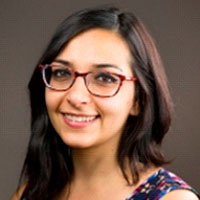 Zeina Alhmoud
Profesora
Professor
Doctora en Lingüística Aplicada a la Enseñanza por la Universidad de Granada (2016). Licenciada en Lenguas Modernas (español e inglés) por la Universidad de Jordania (2006). Actualmente es profesora del Departamento de Lenguas Aplicadas de la Universidad Nebrija. Imparte clases en el Grado de Lenguas Modernas, el Máster en Didáctica de ELE y el Máster en Lingüística Aplicada. Es miembro del grupo de investigación LAELE de la Universidad Nebrija y participa en el proyecto de investigación del Plan Regional (IN.MIGRA2-CM). Su área de investigación se centra en la lingüística cognitiva y su aplicación a la enseñanza de segundas lenguas, y el uso de las imágenes en el aula de L2. Tiene especial interés en el diseño de ilustraciones y materiales didácticos.
Zeina Alhmoud
Profesora
Professor
Doctora en Lingüística Aplicada a la Enseñanza por la Universidad de Granada (2016). Licenciada en Lenguas Modernas (español e inglés) por la Universidad de Jordania (2006). Actualmente es profesora del Departamento de Lenguas Aplicadas de la Universidad Nebrija. Imparte clases en el Grado de Lenguas Modernas, el Máster en Didáctica de ELE y el Máster en Lingüística Aplicada. Es miembro del grupo de investigación LAELE de la Universidad Nebrija y participa en el proyecto de investigación del Plan Regional (IN.MIGRA2-CM). Su área de investigación se centra en la lingüística cognitiva y su aplicación a la enseñanza de segundas lenguas, y el uso de las imágenes en el aula de L2. Tiene especial interés en el diseño de ilustraciones y materiales didácticos.
zdalhmoud@nebrija.es
 Anna Rufat Sánchez
Profesora
Professor
Doctora en Español como Lengua Extranjera por la Universidad de Extremadura y premio extraordinario al mejor doctorado en Humanidades de esta Universidad. Máster en Enseñanza de Español como Lengua Extranjera de la Universidad de Salamanca y licenciada en Filología Hispánica por dicha Universidad. Profesora acreditada por ANECA en la figura de Contratado Doctor. Profesionalmente, ha ejercido la docencia en lengua española en diferentes universidades desde 2001: en la Universidad de Cambridge (2002-2007), en la de Córdoba (2010-2015), en la de Sevilla (2016-2017), y actualmente en la de Extremadura, con docencia en el Máster en Enseñanza de Español. Durante los años en los que ha ejercido su docencia en España ha coordinado e impartido numerosos cursos de enseñanza de español como lengua extranjera a nivel universitario así como cursos de formación de profesores de español como lengua extranjera y segunda, tanto en España como fuera. Sus últimas publicaciones científicas se centran en el aprendizaje y la enseñanza del español en general, y del léxico en particular:
Anna Rufat Sánchez
Profesora
Professor
Doctora en Español como Lengua Extranjera por la Universidad de Extremadura y premio extraordinario al mejor doctorado en Humanidades de esta Universidad. Máster en Enseñanza de Español como Lengua Extranjera de la Universidad de Salamanca y licenciada en Filología Hispánica por dicha Universidad. Profesora acreditada por ANECA en la figura de Contratado Doctor. Profesionalmente, ha ejercido la docencia en lengua española en diferentes universidades desde 2001: en la Universidad de Cambridge (2002-2007), en la de Córdoba (2010-2015), en la de Sevilla (2016-2017), y actualmente en la de Extremadura, con docencia en el Máster en Enseñanza de Español. Durante los años en los que ha ejercido su docencia en España ha coordinado e impartido numerosos cursos de enseñanza de español como lengua extranjera a nivel universitario así como cursos de formación de profesores de español como lengua extranjera y segunda, tanto en España como fuera. Sus últimas publicaciones científicas se centran en el aprendizaje y la enseñanza del español en general, y del léxico en particular:
asanchezru@nebrija.es
 María Cecilia Ainciburu
Profesora
Professor
La Dra. María Cecilia Ainciburu integra el Grupo de Coordinación del Período de Investigación tutelada de los Programas de Máster y Doctorado en Lingüística aplicada a la Enseñanza de E/LE de la Universidad Nebrija. Tiene experiencia formativa en Posgrado para el que ha tutelado trabajos de investigación (Trabajos de fin de master, DEA y doctorado). Ha participado en proyectos de investigación con informe de calificación positivo y publicación de los respectivos materiales en Italia y en Alemania, siempre para fines específicos y con especial atención a alumnos universitarios. Ha colaborado en la redacción de las pruebas nacionales como comisario externo de Español como lengua extranjera (Pruebas de “maturità” requeridas para el ingreso a la universidad) para el Ministero della Pubblica Istruzione en Italia y en los exámenes de Certificación de lenguas que requiere la Universidad de Siena (grupo Cambridge y certificaciones internas de español e inglés). Ha participado en Tribunales de Máster y Doctorado y edita la Revista Nebrija de Lingüística aplicada a la Enseñanza de Lenguas, en la que se promueve el debate sobre temas específicos de la investigación. Es docente de la Universidad de Siena (Italia) de Spagnolo per l’Economia y participa activamente en los eventos profesionales del Español con fines específicos (CIEFE, AELFE, JEFE-VI, entre otros).Sus publicaciones pueden consultarse en: https://scholar.google.com/citations?user=wnrreWgAAAAJ
María Cecilia Ainciburu
Profesora
Professor
La Dra. María Cecilia Ainciburu integra el Grupo de Coordinación del Período de Investigación tutelada de los Programas de Máster y Doctorado en Lingüística aplicada a la Enseñanza de E/LE de la Universidad Nebrija. Tiene experiencia formativa en Posgrado para el que ha tutelado trabajos de investigación (Trabajos de fin de master, DEA y doctorado). Ha participado en proyectos de investigación con informe de calificación positivo y publicación de los respectivos materiales en Italia y en Alemania, siempre para fines específicos y con especial atención a alumnos universitarios. Ha colaborado en la redacción de las pruebas nacionales como comisario externo de Español como lengua extranjera (Pruebas de “maturità” requeridas para el ingreso a la universidad) para el Ministero della Pubblica Istruzione en Italia y en los exámenes de Certificación de lenguas que requiere la Universidad de Siena (grupo Cambridge y certificaciones internas de español e inglés). Ha participado en Tribunales de Máster y Doctorado y edita la Revista Nebrija de Lingüística aplicada a la Enseñanza de Lenguas, en la que se promueve el debate sobre temas específicos de la investigación. Es docente de la Universidad de Siena (Italia) de Spagnolo per l’Economia y participa activamente en los eventos profesionales del Español con fines específicos (CIEFE, AELFE, JEFE-VI, entre otros).Sus publicaciones pueden consultarse en: https://scholar.google.com/citations?user=wnrreWgAAAAJ
caincibu@nebrija.es
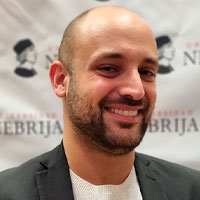 Aarón Pérez Bernabéu
Profesor
Professor
Licenciado en Filología Hispánica por la Universidad de Alicante (UA), Máster en Fonética y Fonología por la UIMP y el CSIC y Máster en Enseñanza de ELE por la UIMP y el Instituto Cervantes. Profesor en diferentes escuelas de idiomas de Madrid y Barcelona. Sus líneas de investigación en el aula de ELE han ido dirigidas a fomentar la reconciliación del profesorado de ELE con la enseñanza de la pronunciación en el aula. Formador en diversas escuelas y universidades que buscaban reforzar el ámbito de la pronunciación entre su profesorado, donde combina los aspectos más teóricos de la Fonética y la Fonología con elementos prácticos de su didáctica, de ahí que tenga investigaciones tanto en aspectos de producción oral como de comprensión auditiva (Pérez Bernabeu, 2019). Doctorando de la UA y coordinador de formación online de la Editorial Edinumen, como el Programa de Desarrollo Profesional (PDP) o el Experto Internacional en Docencia Especializada en ELE (EIDELE), título propio de la Universidad de Salamanca. Profesor de Lengua Española en el Grado de Traducción e Interpretación de la Universidad Internacional de La Rioja (UNIR). Secretario de la Asociación MariCorners, que trabaja por crear espacios de discusión académicos en torno a temas transversales LGTBIQ+.
Aarón Pérez Bernabéu
Profesor
Professor
Licenciado en Filología Hispánica por la Universidad de Alicante (UA), Máster en Fonética y Fonología por la UIMP y el CSIC y Máster en Enseñanza de ELE por la UIMP y el Instituto Cervantes. Profesor en diferentes escuelas de idiomas de Madrid y Barcelona. Sus líneas de investigación en el aula de ELE han ido dirigidas a fomentar la reconciliación del profesorado de ELE con la enseñanza de la pronunciación en el aula. Formador en diversas escuelas y universidades que buscaban reforzar el ámbito de la pronunciación entre su profesorado, donde combina los aspectos más teóricos de la Fonética y la Fonología con elementos prácticos de su didáctica, de ahí que tenga investigaciones tanto en aspectos de producción oral como de comprensión auditiva (Pérez Bernabeu, 2019). Doctorando de la UA y coordinador de formación online de la Editorial Edinumen, como el Programa de Desarrollo Profesional (PDP) o el Experto Internacional en Docencia Especializada en ELE (EIDELE), título propio de la Universidad de Salamanca. Profesor de Lengua Española en el Grado de Traducción e Interpretación de la Universidad Internacional de La Rioja (UNIR). Secretario de la Asociación MariCorners, que trabaja por crear espacios de discusión académicos en torno a temas transversales LGTBIQ+.
aperezbe@nebrija.es
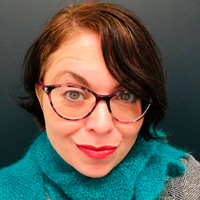 Miriam Sajetá Souza
Profesora
Professor
Miriam Sajeta imparte clases desde hace 8 años en la University of Applied Sciences de Augsburg (Alemania), como profesora en el departamento de español del centro de idiomas “Zentrum für Sprachen und Interkulturelle Kommunikation”. Ha colaborado en calidad de profesora en la formación del profesorado del Instituto Cervantes de Munich y Bremen, en el área de Educación de la Universitat Abat Oliba CEU de Barcelona y como profesora del cuadro de docentes de la Editorial Difusión.
Desde hace veintitrés años comenzó a trabajar como profesora de lenguas y teatro en diferentes Liceos y en el Conservatorio de Arte Dramático de Buenos Aires.
Diplomada por la Asociación Española de Psicoterapia Gestalt A.E.T.G./CIPHAR y Licenciada en Historia del Arte y Escénicas por la Universidad de Buenos Aires/UBA continuó su formación realizando el Master de Musicoterapia Humanista en la Universidad Autónoma de Madrid/UAM, presentando su tesis final sobre “Musicoterapia y Cine”. Ha trabajado en varias instituciones del ámbito educativo en Buenos Aires, Madrid, Barcelona, Génova, Múnich, Berlín, Stuttgart, Frankfurt, Hannover, Colonia y Augsburg como docente y pedagoga de Teatro, Oratoria, Lenguaje Corporal y Comunicación Intercultural.
Miriam Sajetá Souza
Profesora
Professor
Miriam Sajeta imparte clases desde hace 8 años en la University of Applied Sciences de Augsburg (Alemania), como profesora en el departamento de español del centro de idiomas “Zentrum für Sprachen und Interkulturelle Kommunikation”. Ha colaborado en calidad de profesora en la formación del profesorado del Instituto Cervantes de Munich y Bremen, en el área de Educación de la Universitat Abat Oliba CEU de Barcelona y como profesora del cuadro de docentes de la Editorial Difusión.
Desde hace veintitrés años comenzó a trabajar como profesora de lenguas y teatro en diferentes Liceos y en el Conservatorio de Arte Dramático de Buenos Aires.
Diplomada por la Asociación Española de Psicoterapia Gestalt A.E.T.G./CIPHAR y Licenciada en Historia del Arte y Escénicas por la Universidad de Buenos Aires/UBA continuó su formación realizando el Master de Musicoterapia Humanista en la Universidad Autónoma de Madrid/UAM, presentando su tesis final sobre “Musicoterapia y Cine”. Ha trabajado en varias instituciones del ámbito educativo en Buenos Aires, Madrid, Barcelona, Génova, Múnich, Berlín, Stuttgart, Frankfurt, Hannover, Colonia y Augsburg como docente y pedagoga de Teatro, Oratoria, Lenguaje Corporal y Comunicación Intercultural.
msajetso@nebrija.es
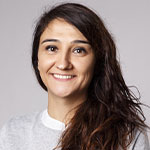 Teresa Simón Cabodevilla
Profesora
Professor
Doctora en Lingüística Aplicada a la Enseñanza de ELE por la Universidad Antonio de Nebrija, Máster en Enseñanza de ELE por la Universidad Complutense de Madrid (UCM), licenciada en Filología Hispánica por la Universidad de Salamanca y poseedora del Certificate in Professional Studies (CPS) por la Universidad de Liverpool. Ha trabajado como lectora MAEC-AECID en la Universidad de Jordania en Ammán (2007-2010) y en la Universidad de Delhi en India (2010-2013) donde dirigió la sección de español del Diploma FLE (Foreign Language Education) formando a futuros profesores de español. Ha trabajado en China en la Universidad SWUST en la provincia de Sichuan (2013-2014) y en Jiangsu en Xi’an Jiaotong- Liverpool University (2014-2018). Ha colaborado como profesora de español, de literatura hispana y formadora de profesores impartiendo diferentes talleres en los Institutos
Cervantes de Ammán y Nueva Delhi. Es autora del libro Destrezas orales: expresión e interacción en ELE (Editorial UNED, 2017) y de diversos materiales del Centro Virtual Cervantes. Ha disfrutado de una beca predoctoral en la Universidad Nebrija donde ha realizado su tesis sobre expresión de la emoción en alumnos sinohablantes aprendientes de ELE. Entre sus líneas de investigación se encuentran emoción y adquisición de LE/2L, léxico emocional, expresión e interacción orales, ELE para sinohablantes, y español como lengua de migrantes y refugiados.
Teresa Simón Cabodevilla
Profesora
Professor
Doctora en Lingüística Aplicada a la Enseñanza de ELE por la Universidad Antonio de Nebrija, Máster en Enseñanza de ELE por la Universidad Complutense de Madrid (UCM), licenciada en Filología Hispánica por la Universidad de Salamanca y poseedora del Certificate in Professional Studies (CPS) por la Universidad de Liverpool. Ha trabajado como lectora MAEC-AECID en la Universidad de Jordania en Ammán (2007-2010) y en la Universidad de Delhi en India (2010-2013) donde dirigió la sección de español del Diploma FLE (Foreign Language Education) formando a futuros profesores de español. Ha trabajado en China en la Universidad SWUST en la provincia de Sichuan (2013-2014) y en Jiangsu en Xi’an Jiaotong- Liverpool University (2014-2018). Ha colaborado como profesora de español, de literatura hispana y formadora de profesores impartiendo diferentes talleres en los Institutos
Cervantes de Ammán y Nueva Delhi. Es autora del libro Destrezas orales: expresión e interacción en ELE (Editorial UNED, 2017) y de diversos materiales del Centro Virtual Cervantes. Ha disfrutado de una beca predoctoral en la Universidad Nebrija donde ha realizado su tesis sobre expresión de la emoción en alumnos sinohablantes aprendientes de ELE. Entre sus líneas de investigación se encuentran emoción y adquisición de LE/2L, léxico emocional, expresión e interacción orales, ELE para sinohablantes, y español como lengua de migrantes y refugiados.
tsimon@nebrija.es
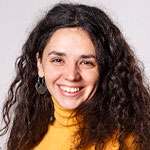 Cristina Herrero Fernández
Profesora
Professor
Licenciada en Traducción e Interpretación por la Universidad de Salamanca, Doctora y Máster en Lingüística aplicada a la enseñanza de ELE por la Universidad Antonio de Nebrija. Ha trabajado como profesora, examinadora, traductora e intérprete en países como China, Corea, Austria, Irlanda, India y Nueva Zelanda. En concreto, ha desempeñado su labor como profesora de ELE en la Universidad Hindú de Benarés (India), el Instituto Cervantes de Nueva Delhi (India) y el Centro de Estudios Hispánicos de la Universidad Nebrija (Madrid). Ha sido formadora de profesores en India y Nueva Zelanda, donde dirigió la sede de la Universidad de Salamanca en Auckland. Posteriormente, como delegada pedagógica de la editorial enClave-ELE, realizó labores de edición, formación de profesores y creación de material didáctico. Ha impartido talleres en universidades e instituciones de enseñanza de español de Asia, Europa y África sobre temas como la gamificación, la clase invertida, las nuevas tecnologías, el uso de la música en el aula, la enseñanza de español a niños, etc.
Actualmente realiza su tesis doctoral en el campo de la fonopragmática, gracias a una beca pre-doctoral de la Universidad Antonio de Nebrija. Entre sus intereses de investigación figuran la adquisición del componente fónico, el uso de la música en el aula para la adquisición de la entonación, los métodos de alfabetización de inmigrantes, la adquisición del componente pragmático en la L2 y la enseñanza de ELE a sinohablantes.
Cristina Herrero Fernández
Profesora
Professor
Licenciada en Traducción e Interpretación por la Universidad de Salamanca, Doctora y Máster en Lingüística aplicada a la enseñanza de ELE por la Universidad Antonio de Nebrija. Ha trabajado como profesora, examinadora, traductora e intérprete en países como China, Corea, Austria, Irlanda, India y Nueva Zelanda. En concreto, ha desempeñado su labor como profesora de ELE en la Universidad Hindú de Benarés (India), el Instituto Cervantes de Nueva Delhi (India) y el Centro de Estudios Hispánicos de la Universidad Nebrija (Madrid). Ha sido formadora de profesores en India y Nueva Zelanda, donde dirigió la sede de la Universidad de Salamanca en Auckland. Posteriormente, como delegada pedagógica de la editorial enClave-ELE, realizó labores de edición, formación de profesores y creación de material didáctico. Ha impartido talleres en universidades e instituciones de enseñanza de español de Asia, Europa y África sobre temas como la gamificación, la clase invertida, las nuevas tecnologías, el uso de la música en el aula, la enseñanza de español a niños, etc.
Actualmente realiza su tesis doctoral en el campo de la fonopragmática, gracias a una beca pre-doctoral de la Universidad Antonio de Nebrija. Entre sus intereses de investigación figuran la adquisición del componente fónico, el uso de la música en el aula para la adquisición de la entonación, los métodos de alfabetización de inmigrantes, la adquisición del componente pragmático en la L2 y la enseñanza de ELE a sinohablantes.
cherrerof@nebrija.es
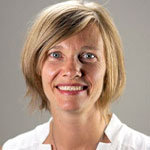 Alice Foucart
Profesora
Professor
Experta en psicolingüística. Su investigación se centra en el procesamiento del lenguaje en primer y segundo idioma y también investiga cómo el lenguaje influye en otros aspectos cognitivos, como la toma de decisiones, el procesamiento de emociones y la cognición social. Lleva a cabo su investigación empírica utilizando metodologías conductuales y (electro-) fisiológicas, como el eye-tracker y potenciales evocados (ERPs).Tiene un doctorado de la University of Edinburgh (Reino Unido) y de la Université de Provence (Francia), un Máster en Ciencias del Lenguaje (Université de Provence, Francia, University of York, Reino Unido) y una licenciatura en inglés (Université de Lille, Francia). Trabajó sucesivamente como investigadora postdoctoral en tres instituciones del Reino Unido (Heriot-Watt University, University of Edinburgh y University of Bangor) y luego integró la Universitat Pompeu Fabra (España) antes de dirigir un proyecto Marie Sklodowska-Curie en Ghent University (Bélgica). Ahora es investigadora principal del grupo de investigación en Lingüística Aplicada a la Enseñanza de Lenguas Extranjeras (LAELE) en la Facultad de Lenguas y Educación, y del Centro de Ciencia Cognitiva (C3) de la Universidad Nebrija.
Alice Foucart
Profesora
Professor
Experta en psicolingüística. Su investigación se centra en el procesamiento del lenguaje en primer y segundo idioma y también investiga cómo el lenguaje influye en otros aspectos cognitivos, como la toma de decisiones, el procesamiento de emociones y la cognición social. Lleva a cabo su investigación empírica utilizando metodologías conductuales y (electro-) fisiológicas, como el eye-tracker y potenciales evocados (ERPs).Tiene un doctorado de la University of Edinburgh (Reino Unido) y de la Université de Provence (Francia), un Máster en Ciencias del Lenguaje (Université de Provence, Francia, University of York, Reino Unido) y una licenciatura en inglés (Université de Lille, Francia). Trabajó sucesivamente como investigadora postdoctoral en tres instituciones del Reino Unido (Heriot-Watt University, University of Edinburgh y University of Bangor) y luego integró la Universitat Pompeu Fabra (España) antes de dirigir un proyecto Marie Sklodowska-Curie en Ghent University (Bélgica). Ahora es investigadora principal del grupo de investigación en Lingüística Aplicada a la Enseñanza de Lenguas Extranjeras (LAELE) en la Facultad de Lenguas y Educación, y del Centro de Ciencia Cognitiva (C3) de la Universidad Nebrija.
afoucart@nebrija.es
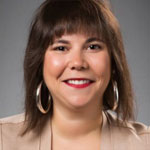 Alicia Luque
Profesora
Professor
Alicia Luque es Profesora Asociada de Lingüística Aplicada en la Universidad Nebrija. El Dr. Luque tiene un doctorado en español y lingüística de la Universidad de Illinois en Chicago (EE.UU.). Además, el Dr. Luque tiene una maestría en Estudios Hispánicos y un Certificado de Posgrado Avanzado en Adquisición y Enseñanza de Segundas Lenguas de la Universidad de Oregón (EE. UU.) y una maestría en Psicobiología y Neurociencia Cognitiva de la Universidad Autónoma de Barcelona (España). Así como un Máster en Estudios Ingleses, Comunicación Multilingüe e Intercultural y un Máster en Estudios Ingleses por la Universidad de Málaga (España). Antes de unirse a la Universidad Nebrija, la Dra. Luque ocupó cargos como científica investigadora postdoctoral en UiT The Arctic University of Norway y como profesora asistente de español y lingüística en Texas Tech University (EE.UU.), donde también dirigió el programa de español para hablantes bilingües de herencia. La agenda general de investigación del Dr. Luque es inherentemente colaborativa y multidisciplinaria y está informada por los campos de la (neuro)ciencia cognitiva, lingüística aplicada, y bilingüismo / multilingüismo y objetivos (a) identificar los factores relacionados con el aprendizaje exitoso de idiomas para adultos, (b) comprender cómo la experiencia de ser / convertirse en bilingüe impacta la mente humana, y (c) contribuir al desarrollo de nuevas formas de caracterizar el bilingüismo de adultos como la experiencia de vida inherentemente diversa y dinámica que es.
Alicia Luque
Profesora
Professor
Alicia Luque es Profesora Asociada de Lingüística Aplicada en la Universidad Nebrija. El Dr. Luque tiene un doctorado en español y lingüística de la Universidad de Illinois en Chicago (EE.UU.). Además, el Dr. Luque tiene una maestría en Estudios Hispánicos y un Certificado de Posgrado Avanzado en Adquisición y Enseñanza de Segundas Lenguas de la Universidad de Oregón (EE. UU.) y una maestría en Psicobiología y Neurociencia Cognitiva de la Universidad Autónoma de Barcelona (España). Así como un Máster en Estudios Ingleses, Comunicación Multilingüe e Intercultural y un Máster en Estudios Ingleses por la Universidad de Málaga (España). Antes de unirse a la Universidad Nebrija, la Dra. Luque ocupó cargos como científica investigadora postdoctoral en UiT The Arctic University of Norway y como profesora asistente de español y lingüística en Texas Tech University (EE.UU.), donde también dirigió el programa de español para hablantes bilingües de herencia. La agenda general de investigación del Dr. Luque es inherentemente colaborativa y multidisciplinaria y está informada por los campos de la (neuro)ciencia cognitiva, lingüística aplicada, y bilingüismo / multilingüismo y objetivos (a) identificar los factores relacionados con el aprendizaje exitoso de idiomas para adultos, (b) comprender cómo la experiencia de ser / convertirse en bilingüe impacta la mente humana, y (c) contribuir al desarrollo de nuevas formas de caracterizar el bilingüismo de adultos como la experiencia de vida inherentemente diversa y dinámica que es.
aluque@nebrija.es
 Mercedes Pérez Serrano
Profesora
Professor
Mercedes Pérez Serrano es actualmente Profesora ayudante doctora en el departamento de Lengua española y Teoría de la literatura en la Universidad Complutense de Madrid, donde enseña e investiga en las áreas de lengua española y de enseñanza de español como lengua adicional. Imparte docencia en el Máster de Español como segunda lengua de la UCM y en el Máster de español como lengua extranjera de la UIMP y el Instituto Cervantes. Ha participado en varios proyectos de investigación I+D+i en este ámbito. Ha sido profesora de Lenguas Aplicadas en la Universidad Nebrija, y cuenta con años de experiencia como lectora de español en la Universidad de Columbia y en York University, así como en diversas instituciones académicas en España. Doctora en lengua española por la Universidad de Salamanca y máster en enseñanza de ELE (UIMP e Instituto Cervantes), sus intereses investigadores están centrados en la enseñanza y la adquisición del léxico y la fraseología en lengua extranjera, así como en la expresión de la emoción en lenguas adicionales. Su investigación ha sido difundida en congresos internacionales y en publicaciones de impacto.
Mercedes Pérez Serrano
Profesora
Professor
Mercedes Pérez Serrano es actualmente Profesora ayudante doctora en el departamento de Lengua española y Teoría de la literatura en la Universidad Complutense de Madrid, donde enseña e investiga en las áreas de lengua española y de enseñanza de español como lengua adicional. Imparte docencia en el Máster de Español como segunda lengua de la UCM y en el Máster de español como lengua extranjera de la UIMP y el Instituto Cervantes. Ha participado en varios proyectos de investigación I+D+i en este ámbito. Ha sido profesora de Lenguas Aplicadas en la Universidad Nebrija, y cuenta con años de experiencia como lectora de español en la Universidad de Columbia y en York University, así como en diversas instituciones académicas en España. Doctora en lengua española por la Universidad de Salamanca y máster en enseñanza de ELE (UIMP e Instituto Cervantes), sus intereses investigadores están centrados en la enseñanza y la adquisición del léxico y la fraseología en lengua extranjera, así como en la expresión de la emoción en lenguas adicionales. Su investigación ha sido difundida en congresos internacionales y en publicaciones de impacto.
mperezse@nebrija.es
More Academic Information
Learning Outcomes
Knowledge or content (Knowledge)- Graduates will be able to contrast the ideas and explanations that are currently used about the processes of language learning in different contexts.
- Graduates will be able to summarize the contributions of the different methodological approaches for the teaching of Spanish as a foreign language, as well as current methodological trends.
- Graduates will be able to explain the different levels of didactic programming: curriculum, program, didactic unit and lesson plan.
- Graduates will be able to handle the reference documents of the regulatory institutions of the foreign language teaching systems, as well as the tools for analyzing the environment and analyzing the needs of the learners in order to design the courses.
- Graduates will be able to design activities and will validate resources that favor the acquisition of vocabulary and grammar.
- Graduates will be able to relate the main procedures and strategies to introduce the intercultural contents in the didactics of SFL.
- Graduates will be able to compile advanced methodological studies of the teaching of SFL according to an approach of integrated learning of language and academic content (CLIL).
- Graduates will be able to analyze the factors that intervene in the learning process and use of SFL, the methodological approaches and the most appropriate didactic and evaluation resources for teaching SFL to different profiles of students (children and adolescents, Chinese speakers, learners of neighboring languages).
- Graduates will be able to detect and solve the learning problems of the non-native learner related to the phonetic and orthographic forms of words, sentences and texts in Spanish.
- Graduates will be able to compile and establish at an advanced level the fundamentals of the didactics of pronunciation, intonation and spelling in SFL.
- Graduates will be able to apply the main procedures, techniques and tests of statistical analysis for the processing and interpretation of data.
- Graduates may apply different techniques for the construction of scientific texts that are typical of professional and academic communication (research article, doctoral thesis, review, conference communication, etc.).
- Graduates will be able to critically analyze experiences in the foreign language classroom considering the new learning models.
- Graduates will be able to effectively and coherently program a lesson plan in the field of teaching Spanish as a foreign language.
- Graduates will be able to design comprehension, expression, interaction and oral and written mediation activities, aimed at SFL learners of different levels of SFL proficiency.
- Graduates will be able to integrate into the communicative activities the exercise of metacognitive, cognitive and socio-affective strategies that facilitate the resolution of the task for the learner, in order to favor their autonomous learning of the language.
- Graduates will be able to adequately plan the practice of the different communication skills, in relation to both the linguistic content and the learning processes.
- Graduates will be able to reflect to later analyze the suitability of the process of correction, evaluation and self-assessment in relation to the learning objectives.
- Graduates will be able to critically evaluate the effectiveness and suitability of the different existing systems and techniques of evaluation within the SFL classroom.
- Graduates will be able to analyze the lexical and grammatical contents of main interest or difficulty for learning SFL and reflect on them.
- Graduates will be able to demonstrate a broad level of understanding of relevant linguistic, communicative and cultural aspects in learning and teaching the vocabulary and grammar of Spanish as L2.
- Graduates will be able to analyze the possible linguistic-cultural misunderstandings that may occur in intercultural communication.
- Graduates will be able to elaborate proposals for an effective communication in intercultural contexts.
- Graduates will be able to critically examine the contributions of digital resources for language learning and manage the basic digital tools for the creation of SFL teaching activities.
- Graduates will be able to analyze the basic components involved in programming a specialty course and develop didactic proposals to work on them in their specific context (Business Spanish, Spanish for the academic field, Spanish as an immigration language, etc.).
- Graduates will be able to develop at an advanced level didactic proposals based on the CLIL methodology.
- Graduates will be able to design SFL didactic proposals at an advanced level for learners of different profiles and contexts.
- Graduates will be able to organize in a specialized way different didactic resources to design didactic activities that will help the learner practice pronunciation, intonation and spelling.
- Graduates may apply to new or little-known environments, within broader or multidisciplinary contexts, the concepts, principles, theories, models and methodologies related to the different fields of linguistics applied to the teaching of foreign languages, relevant to the field of the Spanish language.
- Graduates will be able to adequately and originally create reasoned arguments and formulate reasonable hypotheses in the field of language teaching, psycholinguistics and sociolinguistics.
- Graduates may apply ideas developed in academic articles, or in reports of research, design and innovation projects, in order to demonstrate a high ability for reflection and criticism.
- Graduates will be able to prepare a written report of the integration process in the work team and the contributions made during the internship period, demonstrating the ability to reflect on the tasks performed.
- Graduates will be able to simulate didactic and educational intervention proposals that are adapted to different contexts or empirical studies related to a specific aspect of the area of applied linguistics.
- Graduates will be able to elaborate a didactic project or an empirical study related to the teaching-learning of SFL in the form of a written report and orally defend it before a university tribunal.
- Graduates may distinguish the factors that affect the process of acquisition and learning of a foreign language.
- Graduates will be able to use logical reasoning and coherent reflection and analysis procedures to apply them to any lexical and grammatical content within the scope of Spanish as a foreign language.
- Graduates will be able to explain the principles that regulate the use of language in communicative exchanges, especially those that occur between people of different cultures in an educational context.
- Graduates will be able to formulate and coherently link objectives of their projects and their teaching and didactic products in the field of Spanish as a foreign language.
- Graduates will be able to incorporate strategies and didactic resources in a specialized way to the design and implementation in the classroom of activities typical of the CLIL approach.
- Graduates will be able to reflect on different profiles of students in specific contexts of the field of teaching Spanish as a foreign language.
- Graduates will be able to develop learning skills that allow self-directed or autonomous training and research in the area of Spanish as a foreign language.
- Graduates will be able to develop a positive attitude towards fundamental rights, specifying these principles in cooperative learning and respect for scientific and research ethics.
- Graduates may incorporate specialized knowledge, through personal research or by consulting research results in publications or specialized forums in the field of Spanish as a foreign language.
- Graduates will be able to effectively apply the concepts, tools, resources and methods learned in the Master's subjects to professional performance in the context of teaching and learning Spanish as a foreign language, at the service of a teaching project and integrating into a work team under the supervision of a tutor.
- Graduates will be able to develop and interpret data to issue judgments from specialized bibliography in the field of Spanish as a foreign language.
- Graduates will be able to strengthen the effective and creative use of skills that are typical of intellectual work in the specific area of the mother tongue and communication.
Online Study
Admission
Admission requirementsAdmission profile:
- Graduates of a Bachelor's degree or equivalent, in the areas of Philology, Linguistics, Translation, Education, Humanities and Communication Sciences.
- The program may be accessed from other university degrees as long as the candidate has experience in teaching-learning other foreign languages, complementary training in foreign language didactics and has the interests of a future SFL teacher.
In the event that the candidate's mother tongue is not Spanish, they must prove a B2 level of Spanish, through any accredited certificate. Candidates who do not have any official certificate of proficiency in SFL must take the SFL language proficiency test from Nebrija University and reach a B2 level.
The procedure in great detail and the list of documentation to be submitted are publicly accessible in a document [+info] that is completed with the calendar of the enrollment process.
In addition to the legal requirements, the university requires passing its own admission tests that will have the following weighting:
- Academic record [30%]: The grades obtained by the candidate in their previous studies will be assessed.
- Structured personal interview [30%]: The suitability of the candidate will be assessed by virtue of their experience, knowledge, technical and professional skills required to successfully take the intended studies. Their motivation and attitudes will also be assessed, as well as other personal aspects that contribute to their adequate adjustment to the chosen studies. The interview will be conducted in Spanish.
- Presentation document of the candidate [10%]: In a personally-prepared document, the candidate will explain their motivation and interest in the requested studies, as well as any other personal circumstance that they consider relevant for the selection process.
- Program-specific test [30%] Questions with closed and open answers about the mechanisms that regulate the use of the Spanish language, the difficulties of Spanish as a non-native language and the teaching of Spanish as a foreign language.
In the event that the candidate's mother tongue is not Spanish, they must prove a B2 level of Spanish, through any accredited certificate. Candidates who do not have any official certificate of proficiency in SFL must take the SFL language proficiency test from Nebrija University and reach a B2 level.
Once the admission tests have been completed, the Admissions Committee analyzes the results and the documentation submitted by the candidate, and approves or rejects the application.
The Admissions Committee will be made up of the Vice Rector for Academic Organization and Faculty, the Director of University Development, the Dean of the School, the Registrar of the University. Any of them may delegate to any person in their department.
The candidate receives written information about their admission, about the process of formalizing their enrollment in the Program and about the final, duly legalized, documentation that they must submit.
Employability
Career Opportunities
Graduates in Spanish as a Foreign Language: Didactics and Research may work as:
More Information of Internships in CompaniesTestimonials
University Life in Spanish as a Foreign Language: Didactics and Research
Visit all the Activities of the School of Language and Education
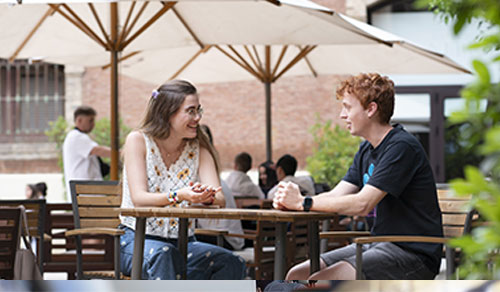
EMILIA Project: TransferLAELE
The didactic applications in which the LAELE Research Group has been working as a result of the R&D projects it develops are included in the TransferLAELE publication, a resource available to teachers of Spanish as a new language, where they will find innovative didactic proposals aimed at different groups of students and levels of language learning. [Read more]
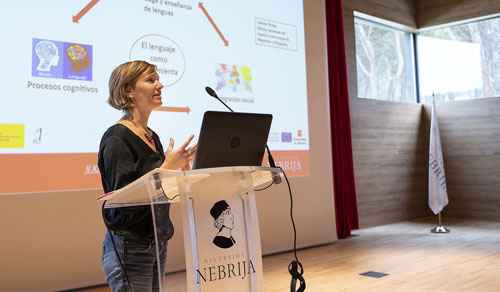
LAELE research group
The research group is part of the School of Languages and Education of the University, and its objective is to understand how we acquire and process foreign languages, especially Spanish and English, from an interdisciplinary point of view, which includes applied linguistics, psycholinguistics and cognitive linguistics. [Read more]

Nebrija Journal of Linguistics applied to language teaching
Periodical publication that analyzes and deals with different topics on language teaching and that has the collaboration of great leaders in the sector. [Read more]
4th Nebrija International Congress on Linguistics Applied to Language Teaching
The School of Languages and Education organized this congress that serves as a meeting point for researchers and teachers, both experts and new members, to have the opportunity to share the results of their studies and didactic experiences.
Opening ceremony of the academic year 2022-2023
Opening Ceremony for the 2022-2023 academic year at the Madrid-Princesa Campus of Nebrija University


